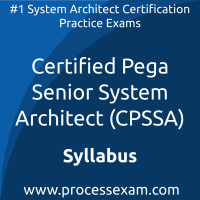 To achieve the professional designation of Certified Pega Senior System Architect from the Pega, candidates must clear the CPSSA Exam with the minimum cut-off score. For those who wish to pass the Pega Senior System Architect certification exam with good percentage, please take a look at the following reference document detailing what should be included in PEGACPSSA24V1 Exam preparation.
To achieve the professional designation of Certified Pega Senior System Architect from the Pega, candidates must clear the CPSSA Exam with the minimum cut-off score. For those who wish to pass the Pega Senior System Architect certification exam with good percentage, please take a look at the following reference document detailing what should be included in PEGACPSSA24V1 Exam preparation.
The Pega CPSSA Exam Summary, Sample Question Bank and Practice Exam provide the basis for the real Certified Pega Senior System Architect (CPSSA) exam. We have designed these resources to help you get ready to take Certified Pega Senior System Architect (CPSSA) exam. If you have made the decision to become a certified professional, we suggest you take authorized training and prepare with our online premium Pega Senior System Architect Practice Exam to achieve the best result.
Pega CPSSA Exam Summary:
| Exam Name | Certified Pega Senior System Architect |
| Exam Code | CPSSA |
| Exam Fee | USD $190 |
| Exam Duration | 90 Minutes |
| Number of Questions | 60 |
| Passing Score | 70% |
| Format | Multiple Choice Questions |
| Books / Trainings | Class Schedule |
| Schedule Exam | Pearson VUE |
| Sample Questions | PEGACPSSA24V1 Exam Sample Questions and Answers |
| Practice Exam | Certified Pega Senior System Architect (CPSSA) Practice Test |
Pega Senior System Architect Syllabus Topics:
| Topic | Details | Weights |
|---|---|---|
| Application Development |
- Define the Enterprise Class Structure - Create an application with the New Application wizard - Understand the rule resolution process; adjust rule availability - Identify how circumstancing affects application behavior - Circumstance rules on a single variable or multiple variables - Differentiate between a queue processor and a job scheduler - Identify the role and elements of activities in case processing - Automate actions when a property value changes - Promote rule reuse with relevant records - Identify the role and impacts of application versioning; Use of ruleset skimming - Configure and validate application rulesets - Branch rulesets for parallel development - Migrate an application; use of product rules
- Explore the integration of Constellation with Portals, SDKs, Web Embed, and the Constellation DX API to extend Pega Platform™ functionality beyond the default customer Portal
- Examine the tools that are available to assist in debugging Constellation applications
|
28% |
| Case Management |
- Differentiate between work groups, work queues, and organizational structures - Configure parallel processing for cases - Manage concurrent case access; locking strategies - Configure flow action pre- and post-processing - Extend service-level agreement configurations |
15% |
| Data and Integration |
- Validate data against a pattern - Identify use cases for keyed data pages - Exchange data with other applications - Manage integration settings - Address integration errors in connectors - Expose an application with a web service
- View data in memory; clipboard tool, pyWorkPage
- Examine the relationships between the Case Type Data Model, Field Types, and the Constellation UI |
19% |
| User Experience |
- Create and customize Pega Web Mashups - Configure Pega Web Mashup authentication
- Display list data in views; configure repeating dynamic layouts
- Group fields in views - Explain the relationship between the Constellation design system, architecture, and DX API - Configure Views to create the user interface in a Constellation application |
5% |
| Reporting | - Design reports with multiple sources; associations and joins | 5% |
| Performance |
- Measure System Performance; use of performance-related tools - Debug system performance - Review log files: Distinguish system events and performance events |
7% |
| Security |
- Distinguish between role-based, attribute-based, and client-based access control - Organize and manage case attachments - Secure data with data encryption
- Track and audit changes to data
|
16% |
| Mobile |
- Differentiate between the delivery options for mobile devices - Design applications for mobile use; use of certificate sets |
5% |
Both Pega and veterans who’ve earned multiple certifications maintain that the best preparation for a Pega CPSSA professional certification exam is practical experience, hands-on training and practice exam. This is the most effective way to gain in-depth understanding of PEGACPSSA24V1 concepts. When you understand techniques, it helps you retain Pega Senior System Architect knowledge and recall that when needed.
